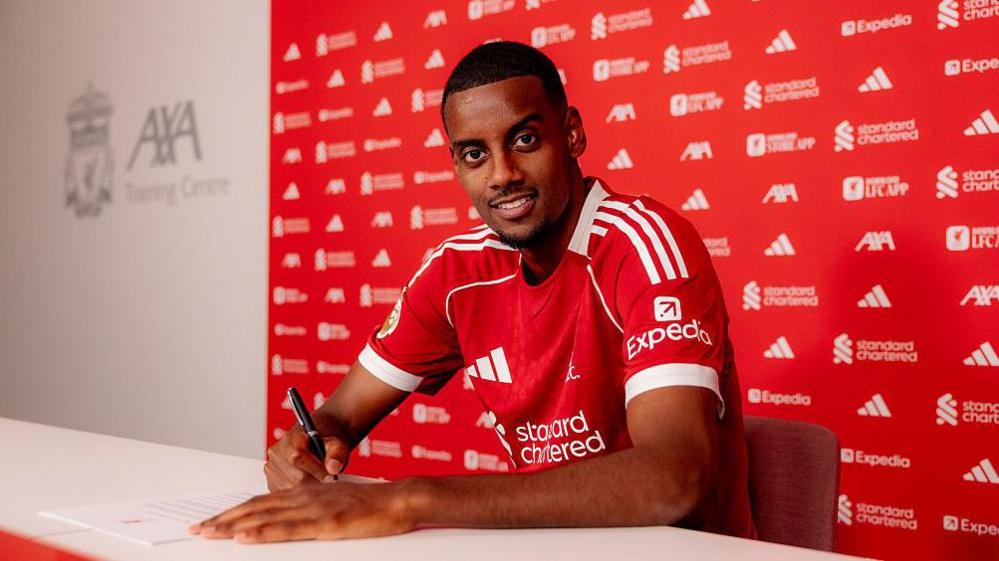Is £3bn Premier League spending cause for concern?

Alexander Isak signed for Liverpool from Newcastle for a British transfer record fee of £125m
- Published
It was the transfer window when spending by Premier League clubs entered uncharted territory.
Buoyed by the start of a record £6.7bn four-year domestic TV deal, and the extra revenue generated by newly expanded European club competitions, the top flight invested more than ever before this summer.
But while the unprecedented £3bn outlay, and the drama of a frenetic deadline day, undoubtedly fuels even more interest in the league, does it also raise concerns?
BBC Sport takes a closer look.
Premier League £3bn summer spending surpasses record
- Published1 September
The player power fallout: 'Despicable' stars or 'hypocritical' clubs?
- Published1 September
£3bn v £10m - Premier League outlay 'difficult to comprehend'
- Published3 September
A widening gap?
On Wednesday, Fifa hailed "the continuing expansion of international player mobility and the growing scale of the global transfer system", adding that England "consolidated its position as the leading global investor in talent".
But for some, serious questions are raised by the fact Premier League clubs spent more than those from the Bundesliga, La Liga, Ligue 1 and Serie A combined - with concern over competitive balance.
Indeed, having seen both Florian Wirtz and Nick Woltemade choose Liverpool and Newcastle United respectively over Bayern Munich this summer, the German champions' honorary president Uli Hoeness spoke out, external about a "completely crazy" spending spree by their English rivals, claiming that it "can't end well".
After a string of other top players left the Bundesliga for England this window, Bayern head coach Vincent Kompany also lamented the struggle to compete with even the smaller Premier League clubs.
Promoted Sunderland, for instance, had a bigger net spend (£118m) than any club in mainland Europe, apart from Real Madrid.
And even in the Championship, Wrexham's £30m summer investment ensured a higher net spend than the likes of Barcelona, AC Milan and Borussia Dortmund.
At a time when Spain's La Liga and Italy's Serie A already want to stage regular season matches abroad, knowing they could be highly lucrative, could the disparity such leagues now face provide even more of an incentive for others to follow suit?
Could it lead to European clubs pushing for a further expansion of the Club World Cup - despite player welfare concerns - or even an attempt at reviving a Super League?
For former Liverpool managing director and Aston Villa chief executive Christian Purslow, the Premier League's spending is simply "a reflection of the huge success of a competition that has a level of media income that dwarfs those of its main rivals overseas".
Purslow is struck more by the gulf with the EFL, and that after two consecutive seasons in which the three promoted clubs from the Championship have been immediately relegated, "the huge leap required" to bridge the gap between divisions "seems to be getting wider".
But he seems most concerned with a growing disparity within the top flight, with another season of profit and sustainability rules (PSR) that limit financial losses forcing more clubs to sell more players in order to comply, and the league's elite talking advantage.
"While it's always been true that the biggest clubs come for players of 'middle-ranking' teams, that trend has become much more mainstream and is causing more of a polarisation between the winners and losers," Purslow told BBC Sport.
Purslow was reflecting on a window in which his former club Aston Villa sold Jacob Ramsey - who had been one of their few remaining senior academy products - to Newcastle United, who themselves sold homegrown Sean Longstaff to Leeds.
"Not only are we seeing the unintended PSR consequence of a perverse incentive to sell homegrown talent [because clubs' own academy products are counted as 'pure profit' in their accounts when sold], in general, the most likely buyers are often the so called 'big six' clubs, who are benefiting from more Champions League revenue than ever," Purslow said.
"It's a dangerous 'double whammy' that's being exacerbated. I think most fans really don't like it. They love to see the spine of their team have a connection to the local community, and seeing such players leave has an extra resonance.
"Fans know that owners are selling not because they don't have the financial resources, but to comply with the rules. So I think there's going to be more and more pressure to liberalise those rules because more fans think there's something wrong when teams like Newcastle and Aston Villa are being forced to sell players."
Having seen Manchester United and Spurs finish narrowly above the relegation zone last season, while the likes of Brighton, Bournemouth and Brentford achieved top 10 status and Crystal Palace won the FA Cup, the biggest clubs appear to have used this window to try to reassert their previous dominance by targeting their domestic rivals' talent.
Indeed, a record £1bn was spent between Premier League clubs, £200m more than last year.
For Purslow, that has strengthened the argument for a modification of PSR in order to encourage clubs to keep hold of the homegrown talent they have developed, and to allow owners to invest more and cover more losses.
"You have to have some level of control, but at the moment it's skewing the competitive landscape," he said.
"Why have rules that encourage us to sell homegrown talent? Let's just make academy players' salaries non-deductible for FFP. It would change behaviour overnight so clubs would keep those players."
Football finance expert Kieran Maguire agrees that the summer has reinforced a "major concern that the owners of the aspirational and ambitious clubs, such as Nottingham Forest, Aston Villa, Newcastle, and so on, are constrained in terms of their ability to spend in a way that didn't exist when Roman Abramovich acquired Chelsea [in 2003] and Sheikh Mansour acquired Manchester City [in 2008]".
Maguire added: "They're on the wrong side of history because the PSR rules, regardless of their intent, has created a glass ceiling and has prevented owners being able to subsidise the clubs to the level they would like."
Despite facing criticism from some clubs, the Premier League has defended PSR, insisting it is needed to avoid over-spending.
In February its clubs chose not to replace it with a new Uefa-style 'squad cost ratio' (SCR) system of financial control which allows them to spend a proportion of their total revenues on team-related costs, which is currently only being trialled.
The nine Premier League clubs that have qualified for European competition will have to comply with Uefa's SCR rules, which are stricter than PSR and allow spending on player wages and fees to amount to no more than 70% of revenues - down from 80% - for 2025.
"I think investment in squads is generally a good thing so long as everyone stays within the rules," Premier League chief executive Richard Masters told BBC Sport last month.
"Squads will be strengthened and that adds to the competitive element. It's a brilliant mix of the best stars from around the world and homegrown talent."
Money owed could be 'potentially contagious'
While the Premier League's overall net spend in the window was £1.36bn thanks to almost £2bn of player sales, Maguire also highlights the amount of deals taking place on credit.
Even before this window, outstanding deferred transfer instalments were more than £3bn. Now it will be much more.
"This is a relatively new phenomenon as transfer fees have increased," Maguire said.
"It is now common for deals to be spread over three to five annual instalments. As a consequence, clubs have ended up with significant transfer debt."
Maguire points to Manchester United, whose transfer payables have rocketed from £34m in 2013, to more than £400m this year.
He said: "This has created a new satellite industry in football where clubs who are owed money for transfers sell the debt to financial institutions and get cash early."
The Premier League can deduct funds from central distributions and redirect them to football creditors in the event of non-payment by a club, while all clubs have to submit financial statements with the aim of reducing the risk of default.
However, Maguire warns: "It will only take one club to have a financial problem for that to be potentially contagious and that could cause a huge ripple effect upon the senior clubs in both English and European football."
Loans and player power

Aston Villa signed Harvey Elliott and Jadon Sancho on loan on deadline day - with an option to make Elliott's deal permanent
Another notable trend this summer has been a flurry of loan deals, with options or obligations to buy.
While this can be in the interests of a player, it can also "help clubs from a PSR point of view as it can delay the cost of player purchases for 12 months", explains Maguire.
But with so many players being loaned out to other clubs, the transient nature of such arrangements also risks diluting the identity of teams.
In the middle of a cost of living crisis, some people are already troubled by the amounts of money being spent on transfers, player wages and agent fees, along with the emergence of so-called 'bomb-squads' of unwanted players.
But on top of that this summer was the perceived lack of loyalty surrounding two of the biggest transfers, those of Alexander Isak and Yoane Wissa, both of whom refused to train with Newcastle and Brentford respectively and issued statements demanding moves.
Viktor Gyokeres also faced disciplinary action by his former club Sporting after failing to report for pre-season training as he pushed for a move to Arsenal.
"I didn't think it was a good look," said Purslow, when asked about the way Isak agitated for his record-breaking transfer to Liverpool after an acrimonious split was finally concluded on deadline day.
Newcastle had rejected Isak's suggestion that he had previously been promised the opportunity to leave.
"Anyone who's worked in the game knows that if a club makes a promise, a player would get that in writing," said Purslow.
"In this case, that would have meant an escape clause, and then there's no debate, we would have seen his transaction happen much earlier. And so a player essentially forcing a move wasn't a great precedent.
"We should acknowledge that clubs often want and need to sell players, so it does cut both ways, but those conversations would happen in private."
In stark contrast, England defender Marc Guehi, who had kept training and playing for Crystal Palace, saw his dream move to Liverpool dashed having been widely praised for his professionalism.
Some will look at the potentially destabilising impact of so many deals - and those that collapsed - and conclude that the window should close before the start of the season.
Others will be concerned that by getting his wish, Isak could lead to more players actively trying to force a move in future.
Regardless, with legal action having recently been launched against Fifa over its transfer rules, some believe players could soon be able to terminate their own contracts, without paying compensation, before those deals come to an end.
Ticket prices
Another worry for many will be the risk that clubs seek to recoup some of their record spending by increasing ticket prices.
League One Mansfield Town manager Nigel Clough has said the Premier League's outlay has become incomprehensible, and risks "pricing fans out".
And with 13 out of the 20 clubs having raised season ticket prices last season, "there is no case for further increases", Football Supporters' Association chair Tom Greatrex told BBC Sport.
"Matchday income generates a small proportion of a club's income, the vast majority comes from media revenues, so squeezing loyal fans further raises little extra money," he said.
"Clubs should listen to their supporter groups who have, across the board, backed our Stop Exploiting Loyalty campaign which calls for a freeze on ticket prices."
Related topics
- Published17 October

